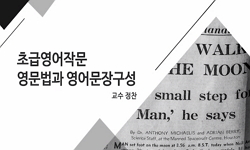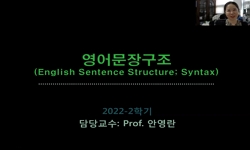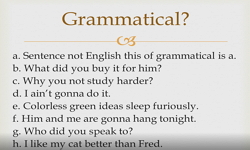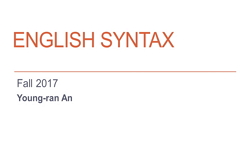There are many kinds of intransitive verbs in inverted PP construction: unaccusative verbs, unergative verbs, copular verbs, etc. of which only unaccusative verbs have been analyzed under Unaccusative Hypothesis without any stipulations. Though some l...
http://chineseinput.net/에서 pinyin(병음)방식으로 중국어를 변환할 수 있습니다.
변환된 중국어를 복사하여 사용하시면 됩니다.
- 中文 을 입력하시려면 zhongwen을 입력하시고 space를누르시면됩니다.
- 北京 을 입력하시려면 beijing을 입력하시고 space를 누르시면 됩니다.
부가정보
다국어 초록 (Multilingual Abstract)
There are many kinds of intransitive verbs in inverted PP construction:
unaccusative verbs, unergative verbs, copular verbs, etc. of which only
unaccusative verbs have been analyzed under Unaccusative Hypothesis
without any stipulations. Though some linguists claim that the accusative
analysis is eminent in generalizing inverted PP constructions, they have
some difficulty describing the inverted PP constructions with unergative
verbs under the unaccusative hypothesis. So we claim that there is no
constraint on the verb selection in inverted PP constructions. So satisfied
with presence of Top Phrase and VDP, the subjects of accusative
constructions stay in VP-internal position and those of unergative
constructions stay in [spec, IP], commonly with preposing the inverted PP
to [spec, TopP]. This inverted PP construction is proposed to be only one
of many inversion types that take place in intransitive constructions
다국어 초록 (Multilingual Abstract)
There are many kinds of intransitive verbs in inverted PP construction: unaccusative verbs, unergative verbs, copular verbs, etc. of which only unaccusative verbs have been analyzed under Unaccusative Hypothesis without any stipulations. Though som...
There are many kinds of intransitive verbs in inverted PP construction:
unaccusative verbs, unergative verbs, copular verbs, etc. of which only
unaccusative verbs have been analyzed under Unaccusative Hypothesis
without any stipulations. Though some linguists claim that the accusative
analysis is eminent in generalizing inverted PP constructions, they have
some difficulty describing the inverted PP constructions with unergative
verbs under the unaccusative hypothesis. So we claim that there is no
constraint on the verb selection in inverted PP constructions. So satisfied
with presence of Top Phrase and VDP, the subjects of accusative
constructions stay in VP-internal position and those of unergative
constructions stay in [spec, IP], commonly with preposing the inverted PP
to [spec, TopP]. This inverted PP construction is proposed to be only one
of many inversion types that take place in intransitive constructions
참고문헌 (Reference)
1 Coopmans,Peter, "Where Stylistic and Syntactic Processes Meet: Locative Inversion in English" 65 : 728-751, 1989
2 Mendikoetxea, Amaya, "Unergatives that ‘become’ unaccusative in English Locative Inversion Structures: A Lexical-Syntactic Approach" Paris: Editions Orhpys 133-155, 2006
3 권기양, "Unaccusativity Condition and PP Subject Constructions" 현대문법학회 (39) : 1-20, 2005
4 Levin, B, "Unaccuasativity: At the Syntax-Lexical Semantics Interface" Cambridge: MIT UP. 1995
5 Culicover, Reter w, "Stylistic Inversion in English: A Reconstruction" 19 (19): 283-310, 2001
6 Jackendoff, Ray, "Semantic Interpretation in Generative Grammar" Cambridge: MIT UP 1972
7 Levine,R, "On focus inversion: syntactic valence and the role of a SUBCAT list" 27 : 1989
8 Bowers.J, "On Surface structure grammatical relations and the structure-preserving hypothesis" 2 : 225-242, 1976
9 Bresnan, Joan, "Locative Inversion in Chichewa: A Case Study of Factorization in Grammar" 50 : 1-50, 1989
10 Bresnan,J, "Locataive Case vs. Locative Gender" 17 : 53-68, 1991
1 Coopmans,Peter, "Where Stylistic and Syntactic Processes Meet: Locative Inversion in English" 65 : 728-751, 1989
2 Mendikoetxea, Amaya, "Unergatives that ‘become’ unaccusative in English Locative Inversion Structures: A Lexical-Syntactic Approach" Paris: Editions Orhpys 133-155, 2006
3 권기양, "Unaccusativity Condition and PP Subject Constructions" 현대문법학회 (39) : 1-20, 2005
4 Levin, B, "Unaccuasativity: At the Syntax-Lexical Semantics Interface" Cambridge: MIT UP. 1995
5 Culicover, Reter w, "Stylistic Inversion in English: A Reconstruction" 19 (19): 283-310, 2001
6 Jackendoff, Ray, "Semantic Interpretation in Generative Grammar" Cambridge: MIT UP 1972
7 Levine,R, "On focus inversion: syntactic valence and the role of a SUBCAT list" 27 : 1989
8 Bowers.J, "On Surface structure grammatical relations and the structure-preserving hypothesis" 2 : 225-242, 1976
9 Bresnan, Joan, "Locative Inversion in Chichewa: A Case Study of Factorization in Grammar" 50 : 1-50, 1989
10 Bresnan,J, "Locataive Case vs. Locative Gender" 17 : 53-68, 1991
11 Kathol, A, "Inversion as a linearization effect" 23 : 207-221, 1992
12 Perlmutter, David, "Impersonal Passive and the Uaccusative Hypothesis" UP of California, Berkeley 157-189, 1978
13 Rochemont, "Focus in generative grammar" Benjamins 1986
14 Kaisse,E.M, "Connected Speech: The interaction of syntax and Phonoloy" Orlando: Academic Press 1985
15 Postal,P, "About a Nonargument for Raising" 8 : 141-154, 1997
동일학술지(권/호) 다른 논문
-
Parametric Variation of Disjunction
- 한국외국어대학교 영미연구소
- Kabyong Park(박갑용)
- 2009
- KCI등재후보
-
Inversion and Adverbial Complements
- 한국외국어대학교 영미연구소
- Tae-Soo Sung(성태수)
- 2009
- KCI등재후보
-
한국인 EFL 학습자의 구술 담화에 나타난 담화표지 so의 편재성
- 한국외국어대학교 영미연구소
- 서경희(Kyung-Hee Suh)
- 2009
- KCI등재후보
-
- 한국외국어대학교 영미연구소
- 이창수(Chang-soo Lee)
- 2009
- KCI등재후보
분석정보
인용정보 인용지수 설명보기
학술지 이력
| 연월일 | 이력구분 | 이력상세 | 등재구분 |
|---|---|---|---|
| 2026 | 평가예정 | 재인증평가 신청대상 (재인증) | |
| 2020-01-01 | 평가 | 등재학술지 유지 (재인증) |  |
| 2017-01-01 | 평가 | 등재학술지 유지 (계속평가) |  |
| 2014-01-13 | 학술지명변경 | 한글명 : Journal of British & American Studies -> 영미연구외국어명 : 미등록 -> Journal of British & American Studies |  |
| 2013-01-01 | 평가 | 등재 1차 FAIL (등재유지) |  |
| 2010-01-01 | 평가 | 등재학술지 선정 (등재후보2차) |  |
| 2009-01-01 | 평가 | 등재후보 1차 PASS (등재후보1차) |  |
| 2008-01-01 | 평가 | 등재후보 1차 FAIL (등재후보1차) |  |
| 2007-01-01 | 평가 | 등재후보학술지 유지 (등재후보1차) |  |
| 2005-01-01 | 평가 | 등재후보학술지 선정 (신규평가) |  |
학술지 인용정보
| 기준연도 | WOS-KCI 통합IF(2년) | KCIF(2년) | KCIF(3년) |
|---|---|---|---|
| 2016 | 0.17 | 0.17 | 0.18 |
| KCIF(4년) | KCIF(5년) | 중심성지수(3년) | 즉시성지수 |
| 0.16 | 0.15 | 0.462 | 0.15 |





 KCI
KCI







